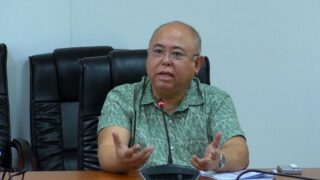Inflation is seen to accelerate to four percent next year following the disruption in the supply of food brought on by Supertyphoon “Yolanda.”
But the rate of rise in consumer prices next year will still be within the government’s target of 3 to 5 percent, said Victor Abola an economist from the University of Asia and the Pacific.
This year, inflation is expected to stay below 4 percent. In the first 11 months of the year, inflation averaged only 2.8 percent.
In a briefing Monday, Abola cited the calamity’s adverse effect on “the agriculture sector’s production capacity.”
The prices of food, which accounts for at least half of the consumer basket of low-income Filipinos families, have a significant impact on overall inflation. But the economist said that the likely uptick in inflation next year would not be worrisome.
Although agriculture production declined following the onslaught of the supertyphoon that struck in November, food inflation could be tempered by cheap imported rice. He said the surplus in rice production in Thailand, Vietnam, and India would enable the Philippines to stabilize prices in the Philippines.





